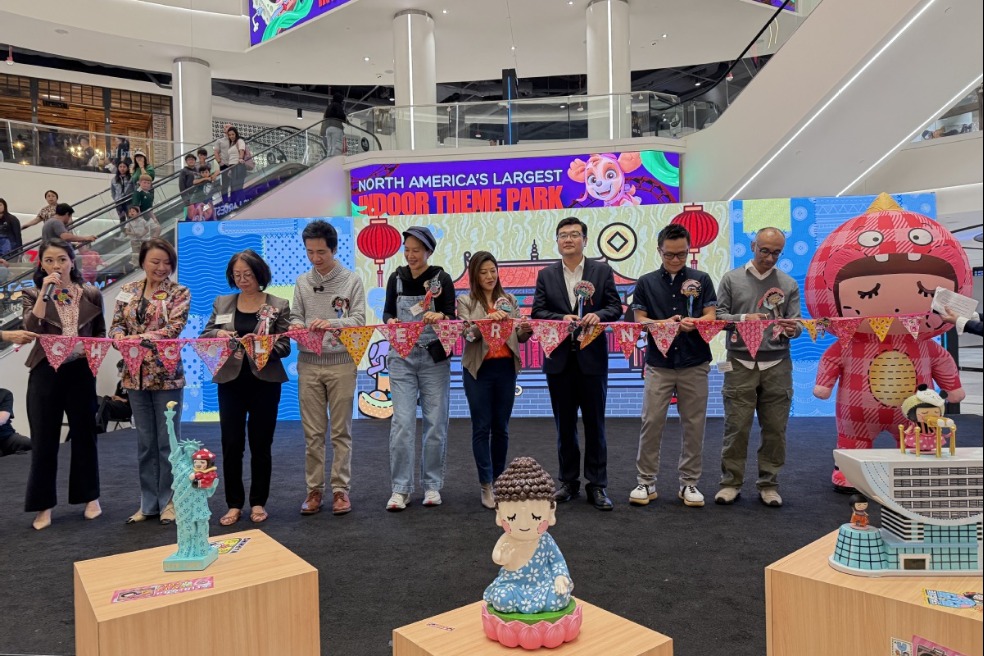A Brazilian's passion for Chinese language started at an early age


Prior to Brazilian Vice-President Hamilton Mourao's visit to China in May, one of his staff members asked Gilberto Vaz to give a half-hour briefing on China for the advisory team at the Planalto Palace presidential building.
After the briefing, the advisers immediately took out their phones to cancel their next meetings. They asked Vaz to stay longer because they wanted to know more about China.
The briefing ended up being four hours.
"They asked lots of questions about China's history, economy and customs. They asked for tips on Chinese etiquette," said Vaz, president of the Brazilian Institute of Chinese Culture and Brasilia Brazil-China Friendship Association.
Vaz is not a scholar on China, but a psychologist by training and profession. His knowledge of China comes from his strong interest in the country since childhood.
When Vaz was about 12 years old growing up in a small Brazilian town, his father, knowing his interest in languages, brought him a magazine article about the origin of Japanese characters.
"I realized that the Japanese origin was Chinese. I tried to find more materials on the topic of Chinese characters since then," Vaz said.
Once he saw a Chinese movie in the small town. The movie banner had some Chinese characters. "I copied the characters without any idea about their pronunciation and meaning. I practiced writing them at home." That's how fascinated Vaz was with Chinese.
When he moved to the capital Brasilia, he was thrilled to find out that all the embassies were located there. He went to the Chinese embassy asking about learning Chinese, where he met a diplomat who gave him a Chinese book.
For eight months in 1989, Vaz regularly went to the embassy after work to learn Chinese from the diplomat. "It was a brilliant and rich experience. He became my first and best Chinese friend," Vaz said.
When the diplomat was about to leave his post, Vaz, trying to find another Chinese-language resource, went to the University of Brasilia to ask the school to provide Chinese lessons.
"The diplomat said he could not imagine a Brazilian university would offer Chinese-language classes," Vaz said.
Vaz's persistence paid off. One year later, the university began to offer a Chinese class, with a teacher coming from Beijing.
Unfortunately, there often were gap years between the comings and goings of Chinese teachers. Coupled with an insufficient number of students interested in lessons beyond basic Chinese, Vaz didn't have the opportunity to advance his Chinese learning as much as he wanted.
He kept studying Chinese language, culture, literature and art on his own with limited resources throughout the years.
In 2003, he founded the Chinese Culture Study Group in Brasilia for people to share knowledge and experiences with Chinese people and culture. There were seven members in total.
"It was a great beginning. Last year, 15 years later, I founded the Brazilian Institute of Chinese Culture with two study groups. GEPAC is the advanced study group. We gather once a month, choose a topic to study and debate for three to five meetings. This allows us to go deeper in terms of research," Vaz said.
The advanced group is membership-based and for people interested in knowing and wanting to know more about China. It has 28 members.
A more general and informal Chinese culture study group called GEChina discusses different topics at each monthly meeting and is open to the general public.
"Our slogan is 'Get to know to get closer. Be friendly to live with'. If people did not know each other, they keep separated from each other. If they know each other, they get closer. No country or person is perfect, and we have to value each other's best characteristics," said Vaz.
Four of the original seven members went to China to study Chinese; three ended up working for either Chinese companies or Brazilian companies doing business with China.
"I am very happy, this shows the success of the program," Vaz said.
When the first Confucius Institute was established in Brasilia in 2009, the then-cultural consul at the Chinese embassy suggested Vaz have his China study meeting inside the CI to help promote CI to the community and help Brazilians learn about CI.
"This ended up being a very rich experience for both sides. We helped CI to get to know the community, we also had a very Chinese environment to gather. We met at CI for more than five years. Later, we chose another place for want of more physical space," Vaz said.
Vaz also studied classic Chinese poem by himself. "When I can't understand it very well, I get in touch with Chinese friends. I learned a few Chinese poems that way."
In 2012, Vaz was invited to attend a function at the Chinese embassy, when then Hanban director Xu Lin was visiting CI at University of Brasilia. He was asked to recite a Chinese classic poem by Su Dongpo from the North Song Dynasty (960 -1127).
"When people were about to leave, her assistant approached me and said that Xu was surprised by my knowledge. He said in China we also sing the poem. I said I can also sing."
Everyone was called back to hear him sing the classic poem. Xu Lin was so impressed that she invited him and members of his China Culture Study Group to visit China for three weeks. Vaz visited China for the first time in 2013, going to Beijing and Dalian. His interest was in Chinese diverse culture, rich history and Chinese people. He bought terracotta warriors in Beijing and Chinese calligraphy works.
Vaz visited Shanghai, Hangzhou and Suzhou during his second trip to China in 2016.
"Now my dream is to visit Xi'an and Guilin; I read much about these places. During my teenage years, I practiced kung fu. One day I want to visit Shaolin Temple," he said.
In May, Vaz established the Brasilia Brazil-China Friendship Association with the goal of intensifying exchanges between Brazil and China. He is trying to organize Brazilians to visit China and to have Chinese visit Brazil.
"We can learn from each other through our trips. I hope Brazil and China will get closer and develop together. I believe a lot of good things will come out of this," Vaz said.

































